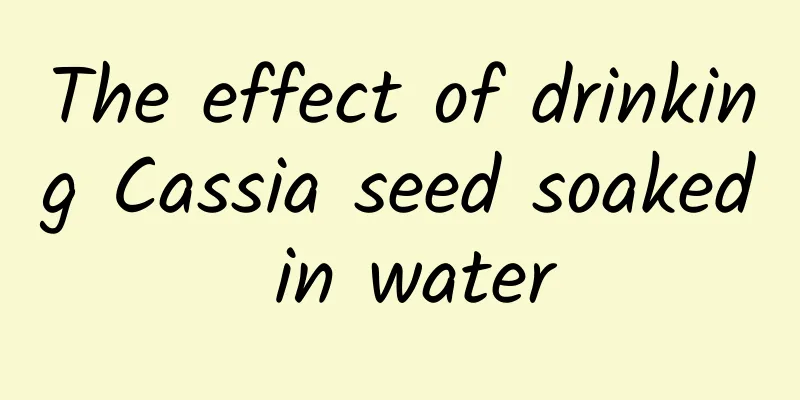The effect of drinking Cassia seed soaked in water

|
The efficacy and functions of Cassia seed have always been utilized and praised by people. Cassia seed itself has the function of treating various eye diseases. It is very effective for glaucoma, conjunctivitis, etc. It is also effective for diseases such as hypertension and hyperlipidemia. Cassia seeds are mostly used to make tea, or made into traditional Chinese medicine, and the effects are very good. So what are the effects of drinking Cassia seeds soaked in water? There are actually many benefits of drinking Cassia seed soaked in water. It can be paired with scented tea, green tea, chrysanthemum, wolfberry, etc. to make tea. It can not only help lose weight, but also excrete most of the toxins in the body. It can be seen that Cassia seed is a good Chinese medicine for making tea for health care. The effect of drinking Cassia seed soaked in water Cassia seed is the dried mature seed of the annual herb of the leguminous family or Cassia sibiricum. The main ingredients are cassia bark, cassia seed, golden cassia bark, etc. This product is sweet, bitter and salty in taste, slightly cold in nature, and enters the liver, kidney and large intestine meridians. As a traditional Chinese medicine, Cassia seed can be used raw or fried, or soaked in water and used as a tea. It has obvious effects. So what are they? The effect of drinking Cassia seed soaked in water 1. Clear the liver and improve eyesight: Cassia seed has a very obvious effect of clearing the liver and improving eyesight. It can treat wind-heat in the liver meridian, and is used for red, swollen and painful eyes, and blurred vision. For example, it has great effectiveness in treating various eye diseases such as amblyopia, dry eyes, white film, red and painful eyes, etc. It can be used together with liver and kidney tonic medicines such as Astragalus membranaceus and Lycium barbarum to treat amblyopia and cataracts. 2. Relieve liver fire and calm liver yang: Cassia seed has a strong effect of relieving liver fire. It can treat headaches and dizziness caused by liver fire or liver yang, and can be used in combination with chrysanthemum, Uncaria rhynchophylla, etc. Lubricates the intestines and promotes bowel movements: Cassia seed contains rhubarb, which has the effect of clearing away heat and moistening the intestines. It can treat internal heat and dry intestines, and constipation. It is often used together with other laxatives such as Trichosanthes kirilowii and Prunus mume. 3. Lower blood pressure: Cassia seed can also be used to treat high blood pressure. Take 20-30 grams of Cassia seed (fried until slightly yellow), 10-15 grams of Honeysuckle, and 15 grams of Chrysanthemum, and brew them with boiling water as tea. Take one dose daily and can be consumed for a long time. Lowering blood lipids: Cassia seed has the effect of inhibiting the increase of serum cholesterol and the formation of atherosclerotic plaques, and can be used to treat hyperlipidemia, fatty liver, etc. 4. Weight loss: Take 15 grams of Cassia seed, fry it in a pan until it turns yellow and has a slight aroma, then grind it into powder; then take 9 grams of Prunella Vulgaris, wash and chop it. Put the two herbs in a cup, brew with boiling water and drink instead of tea. It is suitable for people who are obese and have high blood pressure. 5. Treatment of acute conjunctivitis: 15g each of Cassia seed, Chrysanthemum, Cicada molt, and Amaranthus seed. Decoction in water. 6. Treatment of acute keratitis: Cassia seed 15g, chrysanthemum 9g, Coptis chinensis 9g, Schizonepeta tenuifolia 9g, Coptis chinensis 6g, Akebia 12g. Decoction in water. 7. Treat habitual constipation: Cassia seed 18g and Prunus mume seed 18g. Brew with boiling water as tea. 8. Treatment of night blindness: 9g each of Cassia seed and Lycium barbarum and appropriate amount of pork liver. Boil the liver in water and drink the soup. 9. To treat nightshade: 2 liang of Cassia seeds and 1 liang of Kochia seeds. Grind the above medicines into powder and take one qian of it with clear porridge after each meal. People who should not drink Cassia seed tea: People with kidney deficiency, constipation, obesity, excessive eye use, and those who work in front of computers for a long time are suitable for drinking Cassia seed tea, usually 5 to 15 grams each time. However, it should be noted that patients with spleen and stomach deficiency, weak constitution, loose stools, etc. should avoid eating less. Precautions for use: Pregnant women should not take it. People with weak spleen and stomach, insufficient qi and blood should not take it. Please keep it in a cool and dry place indoors and keep it out of reach of children. Precautions Cassia seed has a cold nature and has diarrhea and blood pressure lowering effects. It is not suitable for patients with spleen and stomach deficiency, spleen deficiency diarrhea, and low blood pressure. In addition, Cassia seed mainly contains compounds such as chrysophanol and rhamnolide, which can cause intestinal lesions if taken for a long time. Suitable combinations: wolfberry, chrysanthemum, lotus leaf, fried cassia seed, and rose. Brewing method: Use roasted Cassia seeds to brew tea. I believe everyone has already understood the effect of drinking Cassia seed soaked in water. In fact, not everyone can drink or take Cassia seed, especially pregnant women, because Cassia seed has a cold nature and can easily cause miscarriage in pregnant women. People with weak spleen and stomach should not drink Cassia seeds, so please be careful. However, it is suitable for people with constipation and obesity. |
<<: The efficacy and function of Chuanxiong
>>: Effects and functions of Coptis chinensis
Recommend
Can honeysuckle be drunk every day and what are its effects
I believe everyone is familiar with the word hone...
Drinking can prevent frostbite and warm the body? Don’t believe these 6 drinking rumors!
When eating, you can't help but drink a few g...
Does an “anti-inflammatory diet” really work? Are foods that claim to be “anti-inflammatory” just a waste of money?
The May Day holiday is over. Many people enjoyed ...
Which is better, fresh bamboo juice or ambroxol?
The main component of fresh bamboo sap is the liq...
The efficacy and function of white ginseng
White ginseng is a type of ginseng. It is a raw s...
No flowers to enjoy in May? Learn more about peonies
As the saying goes, "See peonies in the thre...
Landslide in Qiongzhong, Hainan caused 3 deaths and 4 injuries! Heavy rain caused secondary disasters and risk avoidance guide, remind everyone
Affected by the remnant vortex and cold air of Ty...
How is Cordyceps sinensis formed?
Traditional Chinese medicine has been around for ...
If you don't dance well, it's not only a small matter that you can't get out of bed, but you may even lose your life!
You may not know: In the animal world, there is a...
What are the effects and functions of Malantou?
Amaranth, also known as Amaranth head, is a herba...
Can you see the vortex of Coriolis force in the toilet?
Produced by: Science Popularization China Produce...
Can food allergies be cured by eating more often? Can probiotics treat allergic rhinitis? Don't believe these misunderstandings about allergies!
The World Health Organization has listed allergic...
Medicinal value of water hyacinth
Water hyacinth is a kind of Chinese medicinal mat...
A couple both suffer from lung cancer! Is cancer contagious? Doctor: It is important to do these eight things
Expert of this article: Hu Zhongdong, chief physi...
Finally! It has been made clear: it is forbidden to make and publish videos of overeating, which is very harmful
It is shameful to waste food, and overeating is h...









